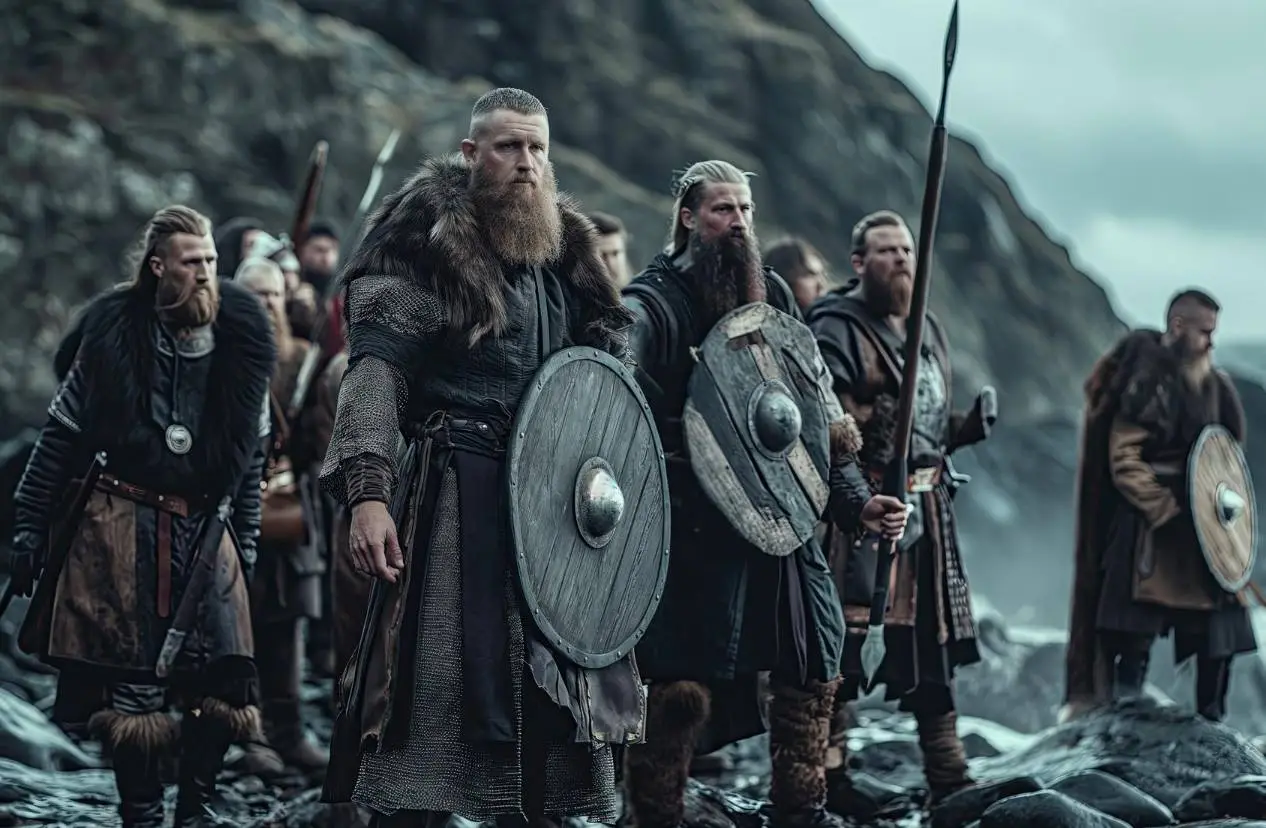Viking Names With Powerful Meanings Inspired By Norse Mythology

The Vikings gained quite a notorious reputation for their raiding and pirating escapades across Europe and Asia, but their history is not all black and white. In fact, they had a vibrant culture that encompassed advanced survival strategies and captivating mythological stories. If you want to choose an appropriate name for your brave little adventurer, explore our list of Viking names inspired by Norse mythology.
What Is A Male Viking Name?
Ragnar
Ragnar is a well-known Viking name that translates to "warrior" or "warrior of judgment." It was carried by the legendary Viking leader Ragnar Lodbrok, who holds a significant place in Norse sagas and history. He is often depicted as a larger-than-life warrior who fearlessly sailed the seas, raided foreign lands, and conquered kingdoms. His sagas recount his daring adventures, his battles against rival Viking warriors, and his heroic raids on the shores of England and France.
Bjorn
Bjorn, which means "bear" in Old Norse, was a popular name among Vikings. It represented strength and bravery, qualities highly esteemed in Viking society. This name evokes images of the mighty bear, a creature known for its ferocity and indomitable spirit. Therefore, it stands as a testament to the enduring legacy of the Vikings and their unwavering admiration for strength and courage.
Erik
Erik, derived from the Old Norse name Eiríkr, signifies "eternal ruler" or "ever powerful." Many notable Vikings shared this name, including Erik the Red, who discovered Greenland. Throughout history, numerous notable figures bearing the name Erik have left their mark on the world, particularly during the Viking Age. Among the most popular ones was Erik the Red, who played a pivotal role in the discovery and colonization of Greenland.
Gunnar
Gunnar, a Viking name meaning "warrior" or "fearless fighter," embodies courage and valor, essential traits for a Viking warrior. This name carries a rich history and a legacy of fearless warriors. It represents a warrior who is not only physically strong but also possesses a fierce determination and unwavering resolve. A Gunnar is someone who is unafraid to stand up for what they believe in and is willing to fight for their honor and the honor of their people.
Leif
Leif, originating from the Old Norse name Leifr, translates to "heir" or "descendant." Leif Eriksson, son of Erik the Red, was a renowned Norse explorer believed to have reached North America before Christopher Columbus. Leif Eriksson's journey to North America, commonly referred to as Vinland, marked a significant milestone in human exploration. Today, the name Leif serves as a reminder of the adventurous spirit and curiosity that drives humanity to explore the unknown.
Harald
Harald, derived from the Old Norse name Haraldr, signifies "leader" or "ruler of an army." Numerous Viking kings were named Harald, emphasizing their authority and might. The name Harald, with its connotations of leadership and military might, encapsulates the essence of Viking culture. It serves as a reminder of the unconquerable spirit and unyielding determination that characterized the Viking Age.
Ivar
Ivar, a Viking name meaning "bow warrior" or "yew warrior," was a popular choice among Norse warriors and leaders. The popularity of the name Ivar among Viking fighters can be attributed to the admiration and respect they held for archery and the symbolism associated with the yew tree. It represented not only their prowess in combat but also their connection to the natural world and the divine forces they believed influenced their lives.
Olaf
Olaf, originating from the Old Norse name Óláfr, translates to "ancestor's descendant" or "heir of the forefathers." Several Viking rulers carried the name Olaf, highlighting their lineage and heritage. The name Olaf carried a sense of authority and respect, as it denoted a leader who possessed the wisdom, strength, and leadership qualities inherited from their ancestors. It served as a reminder of the leader's responsibility to guide their people, protect their lands, and make decisions that would shape the course of their family's history.
Sigurd
Sigurd is a legendary Viking name meaning "victory guardian." As such, it belonged to heroes in Norse mythology and sagas, symbolizing triumph and protection. It was a name that inspired courage and instilled a sense of pride in those who bore it. Even today, the name Sigurd continues to resonate with strength and victory. It serves as a reminder of the indelible mark left by the Viking warriors who embodied conquest.
Thorstein
Thorstein combines the elements "Thor," the Norse god of thunder, and "stein," meaning "stone" or "rock." This name represents strength and divine safeguard in Viking culture. By combining these two elements, the name Thorstein encapsulates the essence of power and heavenly protection. It represents an individual who possesses the strength and might of Thor, as well as the unyielding stability and endurance of a rock. Boys who bear this name are future guardians, capable of providing unwavering protection to their loved ones and their community.
What Is The Most Popular Female Viking Name?
Freydis
Freydis was a legendary Viking warrior and the daughter of Erik the Red. She is known for her bravery and fierce fighting skills. Freydis's legacy as a renowned Viking warrior lives on, inspiring generations to come. Her name will forever be associated with fearlessness, exceptional combat abilities, and an unwavering spirit. She stands as a testament to the fact that gender is no barrier to greatness.
Lagertha
Lagertha is a legendary shieldmaiden and one of the wives of the famous Viking Ragnar Lothbrok. She is known for her strength and leadership qualities. Therefore, the name Lagertha has become synonymous with strength, leadership, and resilience. Her formidable persona and admirable qualities as a leader have left an indelible mark on Viking history.
Astrid
Astrid is a popular Viking name that means “beautiful, loved.” It was commonly used among Viking women. During the Viking Age, Astrid was a popular choice among Viking women, reflecting their desire to bestow upon their daughters a name that symbolized both strength and grace.
Ingrid
Ingrid is another common Viking name that means “beautiful.” It was a popular choice for Viking women. Today, it continues to be a beloved name, cherished for its historical significance and timeless beauty. Whether it is chosen to honor ancestral roots or simply for its aesthetic appeal, Astrid remains a name that evokes a sense of strength, beauty, and love.
Sigrid
Sigrid is a Norse name that means “victory, beautiful.” It was a popular name among Viking women. Women bearing this name were warriors and mothers, embodying the ideals of their society and leaving a lasting legacy. Their strength and beauty were not mutually exclusive; instead, they were intertwined, creating a powerful force that commanded respect and admiration.

Gunnhild
Gunnhild is a traditional Norse name that means “war” or “battle.” It was a popular choice for strong Viking women. The name Gunnhild evokes images of shieldmaidens, women who fought alongside their male counterparts, wielding weapons and displaying exceptional combat skills. These Viking women were not only physically strong but also possessed a fierce mental fortitude, making them formidable opponents in any conflict.
Thyra
Thyra is a Scandinavian name that means “Thor’s warrior.” It was a common name among Viking women who worshipped the god Thor. Viking women who named their daughters Thyra hoped to instill in them the qualities of a warrior - strength, courage, and a fierce determination to protect their loved ones. This way, Thyra became a name associated with strong, independent women who were not afraid to face challenges
Ragnhild
Ragnhild is a Norse name that means “battle advice.” It was a popular choice for wise and strategic Viking women. The name Ragnhild carried a sense of authority and respect, as it represented the embodiment of battle wisdom. Viking women who bore this name were often seen as leaders and advisors, playing a significant role in shaping the outcome of battles and influencing the course of Viking history.
Sif
Sif is a Norse goddess associated with fertility and family. The name was commonly used among Viking women to invoke her protection. In times of uncertainty and hardship, Viking women turned to Sif as a source of strength and hope. They believed that her divine presence would shield them from harm, bless them with fertility, and safeguard their families.
Eira
Eira is a Norse name that means “merciful.” It was a popular choice for compassionate Viking women. In the realm of Norse mythology, Eira was associated with the goddess of healing and medicine, embodying the essence of mercy and benevolence. The name Eira, therefore, not only carries a beautiful meaning but also reflects the virtues and qualities that were highly esteemed in Viking society.
What Are Some Cool Viking Nicknames?
Back in the day, before surnames became the go-to method for distinguishing between people with the same name, nicknames were all the rage. While historical figures had their fair share of interesting titles, the Norse Vikings took the cake with their range of creative nicknames. Here are some of the most popular Viking nicknames.
Bjorn Ironside
Bjorn Ironside was a legendary Viking warrior and the son of the famous Ragnar Lothbrok. His nickname “Ironside” likely refers to his toughness and resilience in battle.
Lagertha the Shieldmaiden
Lagertha was a legendary shieldmaiden and a fierce warrior in Viking sagas. Her nickname, “the Shieldmaiden,” highlights her exceptional skill in combat and her role as a protector.
Ivar the Boneless
Ivar the Boneless was a Viking leader known for his strategic prowess despite his physical disability. The nickname “the Boneless” is believed to refer to a condition he may have had, such as brittle bone disease or some form of paralysis, which did not hinder his ability to lead and fight.
Erik the Red
Erik the Red was a Norse explorer who founded the first Norse settlement in Greenland. His nickname “the Red” could have been due to his red hair or beard, or it might have referred to his fiery temper.
Freydis Eiriksdottir the Fearsome
Freydis Eiriksdottir was a Viking woman known for her bravery and ferocity in battle. Her nickname, “the Fearsome,” reflects her reputation as a formidable warrior.
Harald Fairhair
Harald Fairhair was a king of Norway known for uniting the country under his rule. His nickname “Fairhair” likely refers to his long, flowing hair, which was considered a symbol of his royal status and power.
Gunnar Hamundarson the Noble
Gunnar Hamundarson was a legendary Icelandic hero known for his honor and nobility. His nickname “the Noble” underscores his reputation for fairness and chivalry.
Rollo the Walker
Rollo was a Viking chieftain who became the first ruler of Normandy. His nickname “the Walker” may have originated from stories of him being so tall that no horse could carry him, forcing him to walk everywhere.
Sigurd Snake-in-the-Eye
Sigurd Snake-in-the-Eye was a character from Norse mythology known for having a distinctive mark in his eye that resembled a snake. This nickname added an aura of mystery and intrigue to his persona.
Astrid the Loyal
Astrid was a common Viking name, but when paired with “the Loyal,” it signifies unwavering loyalty and devotion, traits highly valued in Viking society.
What Viking Name Means Powerful?
Magne is a Norwegian name for boys that has its roots in Norse mythology, meaning "powerful" or "brave warrior". Derived from the ancient Norse language, this name exudes strength, valor, and an indomitable spirit. In Norse mythology, Magne is associated with the son of the mighty god Thor, renowned for his immense strength and unwavering bravery.
What Viking Name Means Beautiful?
In Old Norse, the Viking name that means “beautiful” is “Frida”. This name is derived from the Old Norse word “fríðr,” which translates to beautiful, beloved, or peace. It was a common name among the Vikings and reflects their appreciation for beauty and strength. The significance of beauty in Viking culture extended beyond just physical attractiveness; it also encompassed qualities like courage, wisdom, and resilience. The name Frida embodies the ideals of beauty and strength that were valued by the Vikings, making it a fitting choice for those seeking a Viking name with a beautiful meaning.
What Viking Name Means Wolf?
With its origins in the Old Norse term for "wolf," the name Ulf symbolizes power, cleverness, and authority. This name encapsulates the essence of a strong and intelligent individual who possesses the ability to lead and inspire others. Ulf's presence alone is enough to leave a lasting impression, as he embodies the qualities of a true alpha, commanding respect and admiration from all who encounter him.











